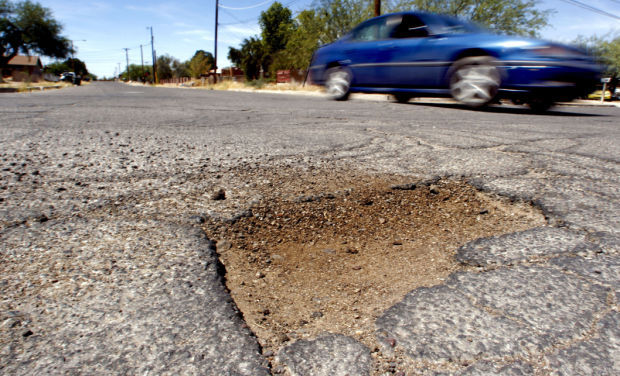Pima County Supervisor Ally Miller is seeking to redirect millions of dollars to road-repair efforts over the next 20 years.
“I believe that the biggest issue that the Board of Supervisors needs to solve is the road problem,” she wrote of the plan on her campaign website. “The board majority has not shown leadership in this area and they continue to blame others for their lack of leadership. Solving our crumbling roads problem will be one of my highest priorities in my next term.”
Funding for the sweeping proposal would come from several sources, including extending a half-cent sales tax for the voter-approved Regional Transportation Authority by a decade in 2026 and directing half of the authority’s revenues to road repair by 2023; ceasing to issue new voter-approved Highway User Revenue Fund bonds; and allocating more of those funds to road repair.
An outline of the plan claims that it would raise more than $1 billion for road repair over 20 years while not raising taxes and ensuring “fairness to all taxpayers.” It describes bonds as a “gimmick” and “not sustainable.” Miller’s plan also calls for putting the voter-approved 1997 bonds “back on the ballot,” arguing that their possible impact on road-repair funding “was not explained to the public.”
Several elements of Miller’s proposal raised the eyebrows of County Administrator Chuck Huckelberry. In a May 19 memo, Huckelberry says the plan does in fact raise taxes and would be unfair to the voters who approved the 1997 bonds and those who live in incorporated parts of the county.
The extension of the RTA sales tax is, in Huckelberry’s estimation, actually a tax increase. And Miller’s proposal to use general fund dollars for transportation staff salaries instead of HURF funds would require a “countywide tax increase.”
Because the latter tax increase would fall on all county residents, including those in incorporated cities who Huckelberry said “would receive no benefit,” he described that part of the plan as “grossly inequitable.”
“To pay for road repairs as Supervisor Miller suggests is poor public policy and even worse tax policy,” Huckelberry wrote. “Such a proposal violates the basic principle of fairness.”
On Friday, Miller told the Arizona Daily Star that because the half-cent sales-tax extension would keep the rate where it was for the previous 20 years, it does not represent an increase. With regard to the new taxes Huckelberry said would be necessary, Miller responded that that assumes the county doesn’t cut what she described as unessential spending elsewhere.
“I believe that this next board needs to come in and cut spending,” she said.
According to Miller’s plan, the funds raised would be used to “fix all roads” in the unincorporated county and its cities. With money raised by extending the RTA tax, for example, the plan would generate $250 million for Pima County and $429 million for “cities within Pima County,” according to her online summary.
Huckelberry has also recently put forward road-repair proposals that include an additional half-cent sales tax administered by the RTA, though suggested pursuing it as soon as this year.
In his memo responding to Miller, he said other parts of her plan are “identical” to his.
As to the proposal to stop issuing additional HURF bonds, Huckelberry said that would amount to a “bait and switch” in which voters would be told that the county “does not intend to comply with their intent” when they approved the $350 million bond package in 1997. Additionally, the bulk of remaining projects in the bond package are within Tucson’s city limits, according to Huckelberry.
Because the proposed suspension of HURF bond issuance would eventually be put to the voters, as would the half-cent sales tax extension, Miller said it was inaccurate to describe it as a “bait and switch.”
“This would go back on the ballot for the voters to decide,” she added.
Outgoing Supervisor Ray Carroll, who has frequently sparred with fellow Republican Miller, said the plan’s chances of being approved are “slim to none” and panned it as appearing to have been “whipped up on a cocktail napkin.”
“This is simply a proposal. It’s a proposal from me. I did it myself,” Miller said of her hope that her plan serves as a starting point for the new board that starts in 2017. “We had to get something on the table to work with.”
“Ray can criticize it, but at the end of the day, Ray Carroll is gone,” she said of her fellow supervisor’s intention to not seek re-election. “And Ray has never put forth any kind of plan.”





